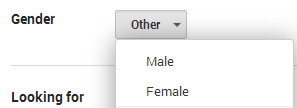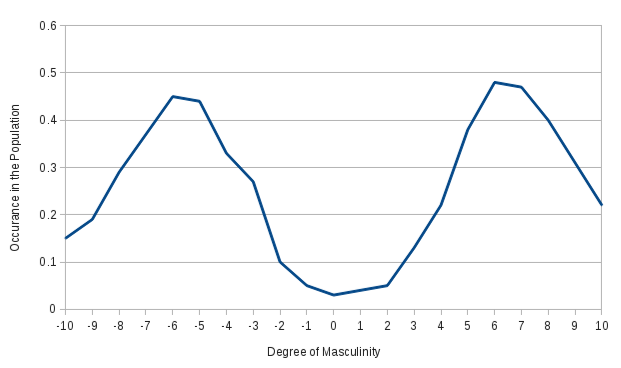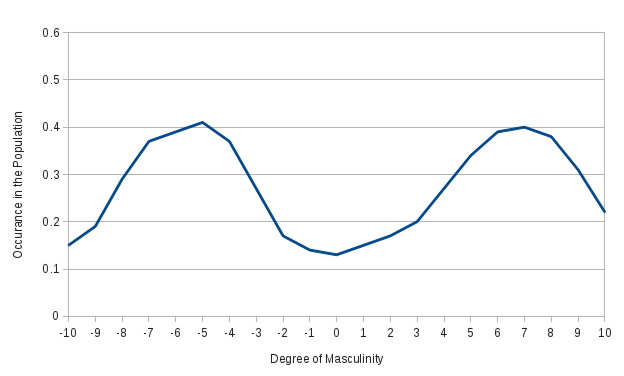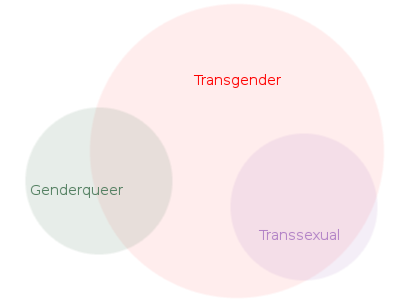Trans/Gender stuff 1001
A quick primer on gender-stuff for those who haven't really thought about it before. With charts.
If you want more on this, good! I can hook you up.
 For most people who've never had cause to question their gender identity, or had anyone near them do the same, gender works a lot like this. You get two choices, you're either one or the other. There is no 'none of the above' and there most definitely is no 'and'. That's how our American culture defines things, so it's kind of the default setting.
For most people who've never had cause to question their gender identity, or had anyone near them do the same, gender works a lot like this. You get two choices, you're either one or the other. There is no 'none of the above' and there most definitely is no 'and'. That's how our American culture defines things, so it's kind of the default setting.
This is the 'gender binary', one or the other. For most people it's just a fact, like number of eyes.
The American political system has two major parties and a bunch of fringe ones no one really pays attention to. Which kind of looks like another binary.

It may look like a political binary, but it isn't. The Democratic Party is actually a grand coalition of left-leaning sub-parties (Labor, Farmers, Blue Dogs, etc) the same way the Republicans are a grand coalition of right-leaning sub-parties (Libertarians, Tea Party, Blue Dogs, etc). Sometimes the sub-parties change sides, like when the Social Conservatives (grudgingly) left the Democrats in the 1980's and the American South became Republican territory.
Gender is just that big and messy, it is not a binary.
But before I get to that, I must clear up something. There are two major definitionals for gender as they relate to an individual. Gender Expression and Gender Identity.
Gender Expression: The gender you present to the outside world (or hope you do).
Gender Identity: The gender you consider yourself to be.
When you consider that most of us do several different kinds of gender expression in a given month, it gets really complex. In a given month I might express any of the following sub-types of Masculine:
- Jeans-and-a-T-shirt nerdboy.
- Suit-wearing businessman.
- Children's sports coach.
- Father.
- Civil-war blacksmith reenactor.
They all fall under "M", mostly anyway, and when viewed as a whole, define a person pretty good. When viewed individually, such as by the people on the other side of the conference table at work, they only get the one facet.
At the 3pm Partners meeting I will be:
Some of these choices are better than others for that meeting. These are expression decisions we make every day, even when we don't realize we're making gender-expression decisions.
But what if this male-presenting person has 'female' as their gender identity? Or has their identity change on a day by day or week by week basis? Filling out that 'Sex' box is trickier.
Which brings us to the gender spectrum.

I made these numbers up just to illustrate what I'm talking about. Two big peaks where most people live, the uncanny valley between the peaks, and the extremes that few people live at. The five expressions I listed above all fall at different places on the right half of that curve (except Sports Coach, which is probably the most neuter thing there).
These days, it feels like the above curve has shifted somewhat.

The peaks aren't as strong, they're broader, and the uncanny valley is less uncanny. Which is good, since I kind of live in that valley.
More terms!
 Here be dragons, but I'm trying to keep it brief.
Here be dragons, but I'm trying to keep it brief.
The term transsexual is for people who are looking to fully transition into the other gender. 'Full' is a loaded term, and I'm skipping a lot of nuance for brevity.
The overarching term transgender encompasses a lot of gender expression ground. It can include people who are transitioning, just not fully; there may be circumstances where they'll present the old way, or maybe they just like it that way.
The term genderqueer is a newer one and the definition hasn't really solidified much, but does cover people who reject the gender binary, are deliberately living in the uncanny valley, are deliberately presenting their gender in ways to make people think, or otherwise not tied to a specific gender identity.
Both transsexual and genderqueer have parts that don't overlap with transgender. Some transsexuals don't consider their gender to be transed after they're fully transitioned. Some genderqueer folk don't think they're transing any gender so the label doesn't apply to them.
You may occasionally run into the term cisgender, or just plain cis as an antonym to trans. Cis/Trans are terms from organic chemistry relating to the handedness of molecules, and they've been co-opted. As with all of this, the usage is not without controversy.
I told you this was messy.
As far as how I define myself: genderqueer, overlapping with transgender.
A Few Words on Etiquette
When interacting with an individual with an unconventional gender presentation, or is known to have presented differently in the past, there are a few things to keep in mind to avoid giving offense.
Pronouns are important
It takes a lot of hard work to fully transition a gender presentation, and when people use the pronoun they spent so long leaving behind, it offends.
Sometimes the old pronoun has a lot of trauma associated with it, and they don't need the reminder.
Yes, figuring out what pronoun they want used can be tricky. If you're at all in doubt, stick to third-person (they/them). If it becomes a problem, ask. It would be nice if we all Just Knew, but we don't.
Example:
I know a guy who gave birth to a son. While pregnant he kept the 'he'. How did he call himself during all of that? He called himself the "gestational parent" of said offspring. A great way to describe his role in creating that child while being gender neutral about it.
Names are important
This goes for anyone changing a name, but failing to use the new name rejects the reason for the name change. That could be marriage (the reason for most name changes), or overcoming years of bad associations.
Insisting on using the old name when you've been told to use the new one is an offensive act. It's called 'dead-naming'.
Real Gender is what they are right now, not what box the doctor checked at birth.
"Abigail Malmquist, who was really a man, was granted her Ph.D in..."
The gender a person was assigned at birth is no more 'real' than the name they were assigned at birth. If you're confused by this, you clearly haven't seen anything about intersex conditions, or genetic conditions like Androgen Insensitivity Syndrome that leads to very feminine individuals with XY chromosomes. Go read, then come back.
Nature is gloriously analog in sexual morphism. Us categorizing humans keep leaving that nuance behind, but we're getting better about it.
Gender is fluid, so don't be surprised at changes.
Having someone change their gender on you can be quite surprising, and finding out they're doing it again can lead to charges of "not meaning it". Just as people are allowed to change their political affiliations over time without charges of 'not meaning it' , something as deeply personal as gender expression can shift over a lifetime.